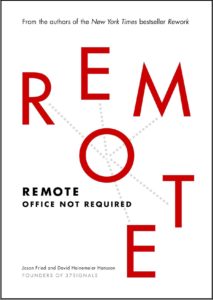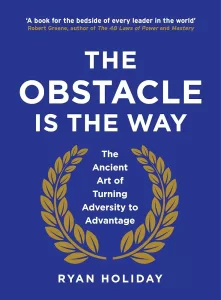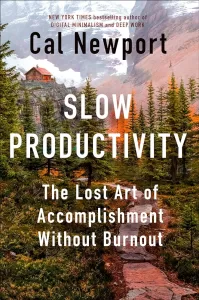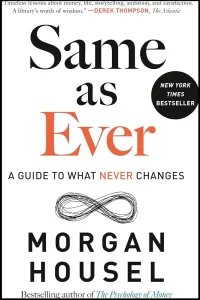Book Review: “Remote”
Book: Remote by Jason Fried and David Heinemeier Hansson
Reviewer: Bobby Powers
My Thoughts: 8 of 10
This is the modern bible on remote work. Fried and Hansson, founders of the software firm 37signals (now called Basecamp), aren't afraid to ruffle feathers and challenge business norms. In this book, they decry the distractions of office work, urge companies to host fewer meetings, and encourage leaders across the world to embrace remote work. Like all of Fried's and Hansson's books, this one is light on text, heavy on pictures, and full of insights you can immediately apply to your 9-5.
What I Learned from the Book
The idea of remote work often prompts immediate questions: How do we know people will actually work? Won't that destroy our company culture? How can we manage people whom we can't see? At first blush, all of these questions are reasonable, but they don't hold up well under scrutiny. With today's technology, remote work is more feasible and effective than ever. It comes with its share of downsides, but those can be thoughtfully managed. This book taught me that remote work is not only possible, but it's a great option for many companies.
Selected Quotes and Ideas from the Book
Background
- "In companies of all sizes, representing virtually every industry, remote work has seen steady growth year after year."
- "In thirty years' time, as technology moves forward even further, people are going to look back and wonder why offices ever existed." -Richard Branson
- "People have an amazing ability to live down to low expectations. If you run your ship with the conviction that everyone's a slacker, your employees will put all their ingenuity into proving you right. If you view those who work under you as capable adults who will push themselves to excel even when you're not breathing down their necks, they'll delight you in return."
Work Doesn't Happen at Work
- "If you ask people where they go when they really need to get work done, very few will respond 'the office.'"
- "The office during the day has become the last place people want to be when they really want to get work done. That's because offices have become interruption factories. A busy office is like a food processor—it chops your day into tiny bits. Fifteen minutes here, ten minutes there, twenty here, five there. Each segment is filled with a conference call, a meeting, another meeting, or some other institutionalized unnecessary interruption."
- "It's incredibly hard to get meaningful work done when your workday has been shredded into work moments."
Benefits of Remote Work
- "Smart people in white coats have extensively studied commuting—this supposedly necessary part of our days—and the verdict is in: long commutes make you fat, stressed, and miserable...According to the research, commuting is associated with an increased risk of obesity, insomnia, stress, neck and back pain, high blood pressure, and other stress-related ills such as heart attacks and depression, and even divorce."
- "The ability to be alone with your thoughts is, in fact, one of the key advantages of working remotely."
- "Letting people work remotely is about promoting quality of life, about getting access to the best people wherever they are...That it may also end up reducing costs spent on offices and result in fewer-but-more-productive workers is the gravy, not the turkey."
- "One of the secret benefits of hiring remote workers is that the work itself becomes the yardstick to judge someone's performance. When you can't see someone all day long, the only thing you have to evaluate is the work. A lot of the petty evaluation stats just melt away. Criteria like 'was she here at 9?' or 'did she take too many breaks today?' or 'man, every time I walk by his desk he's got Facebook up' aren't even possible to tally. Talk about a blessing in disguise! What you're left with is 'what did this person actually do today?'"
- "Once you factor in the hurried rush to get ready in the morning, the commute, and the lingering at the office after hours, the part of your day where you actually connect with your family seems frustratingly slim. Working remotely—especially from home and especially on flexible hours—can dramatically change that dynamic. Imagine eating breakfast with the family without the stress, taking half an hour over lunch to play in the yard together, or being there for a sick child without missing a whole day of work."
- "One of the benefits of allowing your team to work remotely is that it gives them an opportunity to change their scenery as often as they like...Routine has a tendency to numb your creativity."
The Transition to Remote Work
- "Embracing remote work doesn't mean that you can't have an office, just that it's not required. It doesn't mean that all your employees can't live in the same city, just that they don't have to. Remote work is about setting your team free to be the best it can be, wherever that might be."
- "If you're an owner or manager, letting local people work remotely is a great first step toward seeing if remote will work for you...But here's the thing: if you're going to give it a shot, give it a real shot. Try it for at least three months. There's going to be an adjustment period, so let everyone settle into their new rhythm.
- "The big transition with a distributed workforce is going from synchronous to asynchronous collaboration. Not only do we not have to be in the same spot to work together, we also don't have to work at the same time to work together."
- "Most of the time when you hear people imagining why remote work won't work, they'll point to two things in particular: One, you can't have face-to-face meetings when people aren't in the office. And two, managers can't tell if people are getting work done if they can't see them working. We'd like to offer a very different perspective on these two points. We believe that these staples of work life—meetings and managers—are actually the greatest causes of work not getting done at the office. That, in fact, the further away you are from meetings and managers, the more work gets done. This is one of the key reasons we're so enthusiastic about remote work!"
- "Instead of thinking I can pay people from Kansas less than people from New York, you should think I can get amazing people from Kansas and make them feel valued and well-compensated if I pay them New York salaries."
How Basecamp Handles Remote Work
- The entire company gets together 2-3 times per year in their Chicago office for 4-5 days at a time.
- They try to roughly keep a 40-hour workweek, but allow employees to choose their work hours as there is about a 4-hour overlap in shifts for necessary collaboration.
- At least once per week, everyone in the company shares what they've been working on by writing a brief post in the company's collaboration tool (Basecamp).
- To encourage everyone to maintain a healthy lifestyle and get out of the house, Basecamp gives every employee a $100 monthly stipend for a gym membership and covers the cost of weekly fruit and vegetable deliveries.
The Tradeoffs
- "Remote work is not without cost or compromise...there are times when nothing beats talking to your manager in person or sitting in a room with your colleagues, brainstorming the next big thing."
- "One obvious side effect of a remote workforce is reduced face time...When there's a complicated matter to discuss, one requiring a lot of interaction to sort through, few things beat a face-to-face meeting."
- Some jobs aren't a good fit for remote work because they're tied to a physical place, inventory management, etc.
- Work and life are harder to subdivide when both take place in the same location, so companies that offer remote work need to help employees "turn off" to avoid burnout.
- It can be tougher to get to know people virtually, so 37signals compromises by still gathering all employees together a couple of times per year (as described above) and by flying all job candidates into the office for their final interview.
Think you’d like this book?
Other books you may enjoy:
- Creativity, Inc. by Ed Catmull with Amy Wallace
- Work Together Anywhere by Lisette Sutherland and Kirsten Janene-Nelson
Other notable books by the authors:
- It Doesn't Have to Be Crazy at Work
- Rework
Want to become a stronger leader?
Sign up to get my exclusive
10-page guide for leaders and learners.






